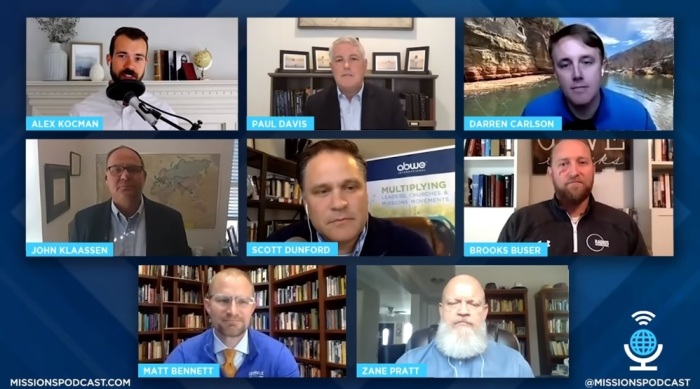How is the coronavirus impacting overseas missions? 4 experts weigh in

A group of experts on Christian missions and former missionaries weighed in how the coronavirus pandemic and subsequent shutdowns are impacting overseas missions.
ABWE International hosted a two-hour episode of The Missions Podcast streamed on social media Monday that featured multiple experts on missionary work.
When asked about how the coronavirus shutdowns were impacting impact mission work, ABWE President Paul Davis posited that “short term missions,” or mission trips that last only a week or so were the most endangered from the pandemic.
“Who are the missionaries that are still engaged? Where is their ministry still going on? Its places where there are long-term missionaries who have devoted decades of their life to cultural and language acquisition,” said Davis.
“Those are the people that are still there, they’re still engaged in ministry, still active, those are the people that churches are seeing and are able to communicate with.”
Alex Kocman, director of advancement and mobilization for ABWE, responded that he had “seen a bottoming out of a lot of interest in certain tracks,” however, he was optimistic about their future.
“Short-term trips … tend to be recurring throughout the calendar year, so we still have people that are asking, that are interested in those things,” Kocman continued.
Kocman noted that where his organization has seen a “slump” in interest has been in “midterm” missions, which are generally considered missions that go for one to four years.
“I think the reason for some of that drop off is because there’s the ambiguity of you don’t know when you’re going to leave for the field, but also the length of the commitment,” he explained.
“Midterm is requiring you to step away from life for a period of years, potentially, but you’re not sure when that’s going to happen.”
Kocman also reported “a major slump-off” in interest for medical missions and healthcare workers, but stressed that “it’s not at crisis level yet,” calling it “still within the realm of normal market fluctuations.”
Darren Carlson, president of Training Leaders International, believes that a 20 percent to 30 percent drop in giving to mission agencies was likely, but that this impact would probably not hit them until “early next year.”
“If people don’t have jobs, then they’re not going to give,” said Carlson. “If you are a mission agency that’s primarily a high skill worker, high tech, you might survive. But if you’re a pure labor worker, service worker donors, your mission agency is in trouble.”
Carlson observed a pause in short-term missions, adding that he saw this as “a case study on whether that will affect mobilization or not.”
“Everyone says that short-term missions is the key to mobilization long-term. Whether that’s true or not is up for debate, but it’s about to not be,” he added.
“Short term missions is a $1.6 billion enterprise in the U.S. and it’s now a zero dollar enterprise. And we’re going to see the ramifications of that really in January, February after year-end giving happens.”
Zane Pratt, vice president for global training at the International Mission Board of the Southern Baptist Convention, echoed the concern about the impact of the suspension of short-term missions.
Pratt referenced research from The Barna Group which indicated that people who go on short-term mission trips were twice as likely as others to become long-term missionaries later on.
“So certainly the suspension of short-term missions is going to have an impact on all of us down the road,” he said, noting that those on short-term mission trips also give more.
Pratt did note that IMB was “holding pretty steady” on mission applications and that midterm mission applications were actually increasing for them, likely because many of them see the shutdowns as subsiding soon.
Has the focus on ‘Unreached People Groups’ harmed the church?

The podcast began by focusing on a controversial piece written by Carlson, who last September wrote a column with Elliot Clark for The Gospel Coalition titled, “The 3 Words That Changed Missions Strategy—and Why We Might Be Wrong.”
Carlson and Clark argued that the term “unreached people group” had been problematic for overseas missions, in part by leading people to stop supporting missions for reached people.
“Material and personnel resources have been redirected out of areas no longer deemed strategic. ‘Reached’ nations have been abandoned, along with their seminaries,” they wrote.
“All of this is no doubt pursued with good intentions, desiring to ‘reach the unreached.’ But sadly, our disregard for certain mission fields has left open the possibility that a people group, once being designated as reached, could revert to unreached status.”
During the podcast, Carlson restated his points, including the argument that the Greek New Testament term “panta ta ethne,” generally translated “all nations,” was meant to apply to Gentiles and not necessarily all ethnic groups worldwide.
“So it seems that the term is broad, not specific, and even broad in the sense of the first century,” said Carlson. “New Testament writers are thinking about Gentiles.”
Brooks Buser, president of Radius International, penned a response along with Chad Vegas to the Carlson article, published in January by The Gospel Coalition, titled, “Why Unreached People Groups Still Matter in Missions.”
In their response, they argued that missions for unreached people groups was not taking away from reached groups, noting that less than 1 percent of Christian giving went to such ministries.
“… if these numbers constitute ‘strategic primacy,’ it’s frightening to consider what further de-emphasizing would look like,” wrote Buser and Vegas.
“Paul shouldn’t be rebuked for giving strategic primacy to places where the gospel had never been (Rom. 15:20). His missionary mandate was to keep moving when there ‘was no longer any room for work in these regions.’”
During the podcast episode, Buser responded that he felt the biblical phrase for “all nations” could actually apply to ethnolinguistic groups and not just a general term for Gentiles.
“I think Darren and I agree on a lot of things,” noted Buser, noting that a point of disagreement is that the common interpretation “panta ta ethne” was to blame for problems with overseas missions.
Is everyone a missionary?
When looking at who is called for missions, Kocman offered up the biblical parallel of the Body of Christ, as explained in First Corinthians 12:12-31.
“There’s hands and there’s feet and there’s kneecaps and there’s eye sockets and there’s every part of that body, but you wouldn’t talk to every member of the body in the same way,” explained Kocman.
“Most people, ordinarily God calls to stay put in their current context and be faithful to Him in the context of their job, their family, their neighborhood.”
Buser agreed with the Body of Christ parallel, pointing out that in the Bible, Titus and Timothy went to churches where Paul of Tarsus had gone to before.
He then noted that Paul “saw a distinction between his role and their role” and expressed his concern on how many American churches call everyone in their congregation a missionary.
“I think this is what gets the American Church into trouble so much is that they call everyone missionaries and when everyone is a missionary, no one is a missionary,” he said.
“In our zeal to protect the kneecaps and the shins and the other parts of the body that are so needed, let’s not misidentify them just to give them this false sense of elevation.”
Other experts on the podcast included John Klaasen, president of Reaching and Teaching, and Matt Bennett, assistant professor of Missions and Theology at Cedarville University.




























